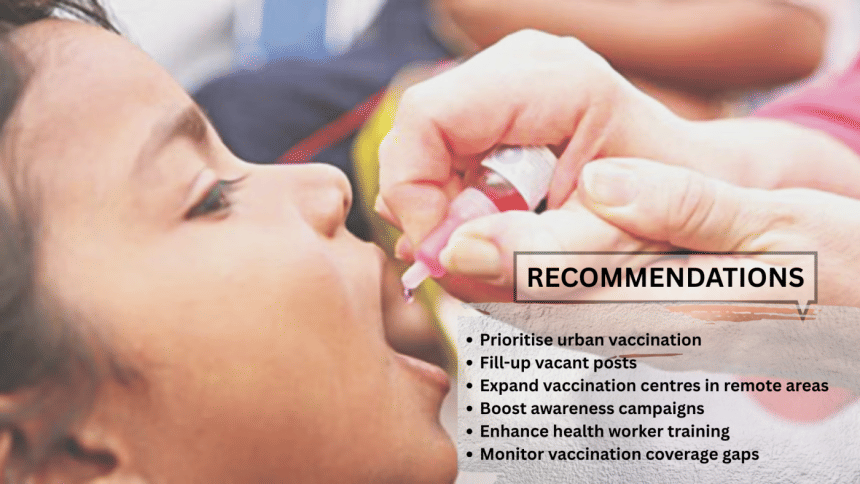16% children still outside immunisation coverage

Although Bangladesh has made significant progress in immunisation coverage, 16 percent of children still remain outside the coverage, warranting stronger efforts in this regard, health experts said yesterday.
They said vaccination coverage has remained between 80 and 84 percent since 2011 due to various challenges, including manpower shortages and an uneven distribution of vaccination centres.
They recommended devising new strategies for urban areas, appointing necessary manpower, ensuring the availability of vaccines, providing proper training for health workers, and conducting awareness campaigns.
The experts were speaking at a national-level meeting titled "Strengthening Immunisation and Health System in Bangladesh," held at the CIRDAP auditorium in Dhaka to mark World Immunization Week 2025.
The event was jointly organised by Unicef Bangladesh and the Shastho Shurokkha Foundation, under the supervision of the Expanded Programme on Immunisation (EPI), with the slogan "Immunisation for all is humanly possible".
Prof Nizam Uddin Ahmed, executive director of Shastho Shurokkha Foundation, said the EPI has contributed to an 81.5 percent reduction in under-five mortality, preventing around 94,000 child deaths annually. Despite these gains, 16 percent of children still remain outside vaccine coverage.
Citing a study by Unicef and the Shastho Shurokkha Foundation, Prof Nizam said nearly 40 percent of positions in the immunisation programme are vacant, including 43 percent at the EPI headquarters.
The study also pointed to an uneven distribution of vaccination centres and poor accessibility in hard-to-reach areas, along with delays in funding and vaccine transportation issues.
Unicef Bangladesh Health Manager Riad Mahmud said vaccine coverage in urban areas is lower than in rural areas and stressed the need to prioritise urban vaccination.
He called for proper implementation of a separate urban vaccination strategy and for city corporations to have their own manpower for the task.
He also emphasised the need to enhance cold-chain capacity and ensure increased domestic financing for immunisation before the transition of Gavi support by 2029.
Prof Sayedur Rahman, special assistant to the chief adviser for health ministry, said reaching every child in urban areas remains a major challenge. He reaffirmed the government's commitment to universal vaccination and urged intensified efforts.

 For all latest news, follow The Daily Star's Google News channel.
For all latest news, follow The Daily Star's Google News channel. 



Comments